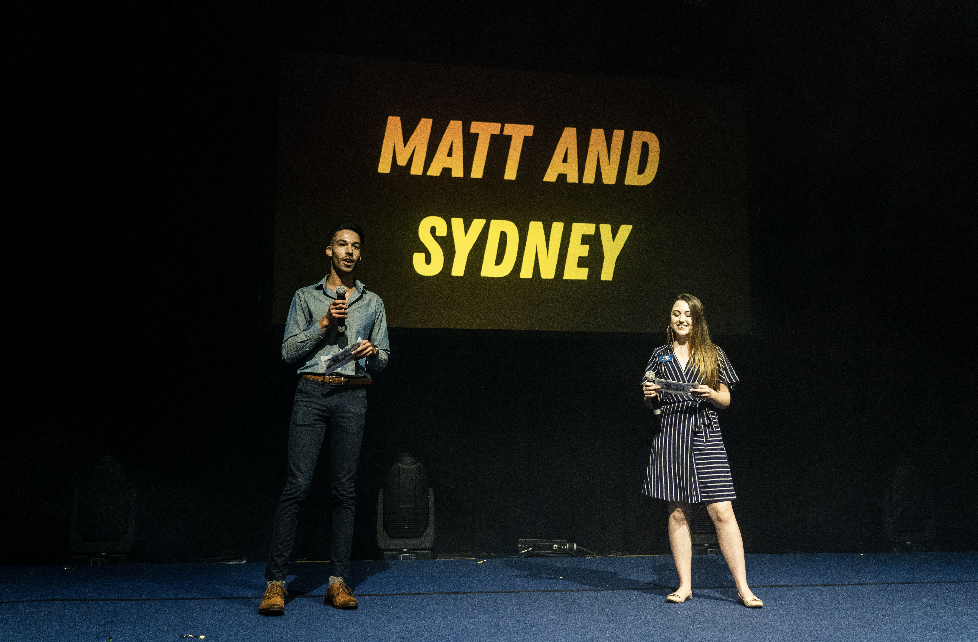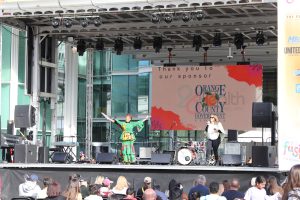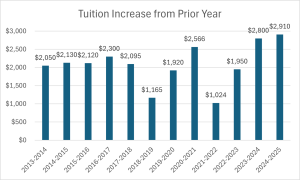By Hannah Butcher and Ellie Rushing

After an election process clouded by an unclear investigation, the Student Government Association (SGA) announced Matthew Weiner (‘20 HH) was elected president and Sydney Brown (‘21) vice president of SGA for the 2019-2020 school year.
Weiner and Brown’s ticket was filled with a long list of initiatives, including efforts to address accessibility concerns, installing ice machines in the resident halls, and providing vans to give students rides to the airport during academic break times. The pair said that their priority will be construction and that this is the timeliest point of their platform.
“I am very relieved, but mostly excited,” said Weiner, who is now the first Holt student to be SGA president. “It’s been a longer process than I anticipated. There was a lot of nerves and anxiety around it.”
Their opponents, Nam Nguyen (‘20) and Harrison Loew (‘21), expressed disappointment for their loss, but they said they are not disheartened. “We want the student body to know this doesn’t discourage us from being leaders on campus or that we won’t continue to fight for what we believe in or for our platform,” said Loew.
The results came after a nearly three-week-long election process, which was halted by SGA’s need to investigate all candidates’ campaign practices.
At 3:30 p.m. on March 8, nearly 24 hours before polls were supposed to close, Nagina Chaudhry (‘19), current SGA president, froze the election. She made the decision after SGA’s judicial board received multiple tips that both pairs of candidates allegedly violated its constitution. After a week-long investigation, members of the judicial board decided that none of the evidence submitted breached the SGA’s constitution and that a hearing was not necessary, according to Isabella Braga (‘20), SGA’s chief justice who oversaw the investigation.
Braga would not describe what the evidence described or portrayed, but she said that “if it was anything substantial, there would have been a hearing.” She said that approximately five pieces of evidence were submitted overall.
Braga then notified Chaudhry of the board’s decision, and SGA re-opened its election for 20.5 hours, from 8 a.m. on Monday, March 25 through 4:30 p.m. on Tuesday, March 26. The results were announced nearly immediately after the polls closed.
Through the entire investigation process, candidates were in the dark. Because the accusations were just allegations, the judicial board could not discuss any of the evidence materials with the candidates unless a hearing was necessary, according to Braga.
“People were confused on everything, so I don’t think it swayed voters,” Weiner said.
SGA would not disclose the voting results or data to The Sandspur because, according to Jade Taylor, assistant director of the Center for Inclusion and Campus Involvement (CICI), this stipulation was not told to the candidates before their campaigns began.
“As an office we would want to make sure that we would communicate all information /policies that would go out that effects candidates before their petitions are turned in,” said Taylor. “Since this is something that we are deciding well after the petition drive period for this year, we would want to wait till next year to make sure everyone is on board with this decision.”
Election results are only known to CICI directors and SGA’s advisors, according to Chaudhry. She said that she does not get to see the numbers. Because Rollins is a private school, the results are not naturally public record.
“Our lack of information… speaks to the importance of transparency in the Student Government,” Brown said. “We must be more dedicated toward promoting transparency in the years to come. The student body deserves to know the exact figures.”
Weiner and Brown will begin their training within the next month. Their training includes various orientations with staff around the school, including a CICI orientation and various workshops. A SGA transition dinner will occur first, in which documents will circulate among the attendees and explain the passage of roles.
Weiner and Brown are “thrilled to get to work and represent the voices of the student body,” said Brown. The election process taught the pair invaluable lessons moving forward.
“I learned a lot of patience and how to work around things in a professional manner,” Weiner said. “Given the election, there were hardships that came with it. I had to do my best to find the best solutions. I knew that, if there is a problem, there needs to be an answer for it. If someone closes a door, it is important to advocate for yourself to reopen it.”











Be First to Comment